当前位置:
X-MOL 学术
›
J. Am. Coll. Cardiol.
›
论文详情
Our official English website, www.x-mol.net, welcomes your
feedback! (Note: you will need to create a separate account there.)
How Medicine Has Changed the End of Life for Patients With Cardiovascular Disease
Journal of the American College of Cardiology ( IF 21.7 ) Pub Date : 2017-09-01 , DOI: 10.1016/j.jacc.2017.07.735 Haider J. Warraich , Adrian F. Hernandez , Larry A. Allen
Journal of the American College of Cardiology ( IF 21.7 ) Pub Date : 2017-09-01 , DOI: 10.1016/j.jacc.2017.07.735 Haider J. Warraich , Adrian F. Hernandez , Larry A. Allen

|
Advances in medicine have changed how patients experience the end of life. With longer life spans, there has also been an increase in years lived with disability. The clustering of illnesses in the last years of life is particularly pronounced in patients with cardiovascular disease. At the end of life, patients with cardiovascular disease are more symptomatic, less likely to die at home, and less likely to receive high-quality palliative care. Social determinants have created widening disparities in end-of-life care. The increasing complexity and duration of care have resulted in an epidemic of caregiver burden. Modern medical care has also resulted in new ethical challenges, for example, those related to deactivation of cardiac devices, such as pacemakers, defibrillators, and mechanical circulatory support. Recommendations to improve end-of-life care for patients with cardiovascular disease include optimizing metrics to assess quality, ameliorating disparities, enhancing education and research in palliative care, overcoming disparities, and innovating palliative care delivery and reimbursement.
中文翻译:

医学如何改变心血管疾病患者的生命终点
医学的进步改变了患者体验生命终结的方式。随着寿命的延长,残疾的寿命也有所增加。在生命的最后几年,疾病的聚集在心血管疾病患者中尤为明显。在生命的尽头,心血管疾病患者的症状更多,在家中死亡的可能性更小,接受高质量姑息治疗的可能性也更小。社会决定因素在临终关怀方面造成了越来越大的差距。护理的复杂性和持续时间的增加导致护理人员负担的流行。现代医疗保健也带来了新的伦理挑战,例如,与心脏设备停用相关的挑战,如起搏器、除颤器和机械循环支持。
更新日期:2017-09-01
中文翻译:

医学如何改变心血管疾病患者的生命终点
医学的进步改变了患者体验生命终结的方式。随着寿命的延长,残疾的寿命也有所增加。在生命的最后几年,疾病的聚集在心血管疾病患者中尤为明显。在生命的尽头,心血管疾病患者的症状更多,在家中死亡的可能性更小,接受高质量姑息治疗的可能性也更小。社会决定因素在临终关怀方面造成了越来越大的差距。护理的复杂性和持续时间的增加导致护理人员负担的流行。现代医疗保健也带来了新的伦理挑战,例如,与心脏设备停用相关的挑战,如起搏器、除颤器和机械循环支持。











































 京公网安备 11010802027423号
京公网安备 11010802027423号